We celebrate the 2024 recipients. They are all prime examples of the right camp program’s capacity to equip campers of all abilities and backgrounds with the determination, desire, and belief to build brighter futures for themselves and their communities.
Camp Kiwanis L.I.N.K. Program
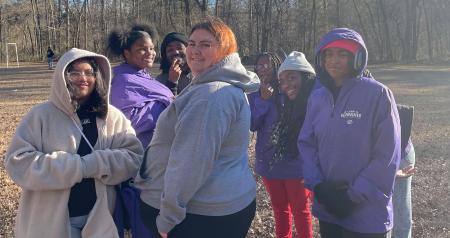
The Leaders in Nature’s Kingdom (L.I.N.K.) program, originally established in 1982 by Lee Fox and Mike Miller, takes place at Camp Kiwanis, which is owned and operated by Boys & Girls Clubs of Metro Atlanta. Their mission is to “ignite the unlimited potential of kids and teens by providing safe, inclusive, and engaging environments.” Camp Kiwanis helps the 25 Metro Atlanta clubs achieve that mission by providing environmental education and outdoor recreation on their 160-acre property along the Broad River in Madison County, Georgia.
The L.I.N.K. program is a four-year, year-round program designed to prepare Boys & Girls Clubs of Metro Atlanta members to assume leadership positions at their clubs, in their communities, and at Camp Kiwanis. Middle- and high-school-aged program participants attend camp one weekend a month, from September through May, where they learn soft skills in leadership, problem-solving, communication, goal setting, and role-modeling, as well as the hard skills of camp activities. During each summer they work their way up through the program, starting as assistants to the counselor, then working in the kitchen (because to learn how to lead, you must learn how to serve), and on to instructors, then counselors and staff.
“We are so proud of our current L.I.N.K. program, and how it has grown and evolved to meet the youths’ needs over the years,” said Carly Robinson, camp director for Camp Kiwanis. “As we bring city kids from Metro Atlanta out into the woods for traditional camp experiences, it is important that they see themselves in the faces of our staff members. The best way to do that is to ‘grow our own.’ Leaders in Nature’s Kingdom allows us to start training youth at age 13 and have some of the best staff and counselors ever, once they reach 18. Most of our city kids fear the great unknown woods (or at least the Hollywood versions of it) and are afraid of the woods when they arrive on Monday. But, by the time they leave on Friday, they don’t want to go back to the big city, since they were finally able to experience the wonders of nature down by the riverside.
“L.I.N.K. is the heart and soul of our camp program and has carried on many traditions throughout the years. With night hikes, nature programs, and land and river activities led by our courageous teens, our campers know they can do hard things too.”
In the future, Robinson hopes they can continue to grow their program.
“We hope to carry on the tradition for many years to come,” she said. “We were able to expand the program this year to allow more students to participate since we have had a rise in teen interest. We also hope to utilize our alumni more in the future, as their post-program success speaks volumes for what they learned with us.”
Camp Pemigewassett — Cans from Campers
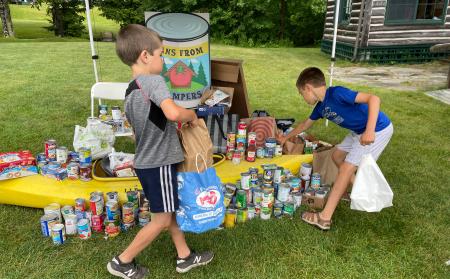
In 2015, Camp Pemigewassett started its Cans from Campers program to fight summer food insecurity.
According to Camp Administrator Dottie Reed, when summer arrives, children who are eligible for food assistance at school no longer have access, and food pantry shelves are often bare. Reed said summer camps are ideally positioned to make a difference.
“There’s nothing new about a food drive. What’s new is the recognition that summer camps open their doors at the exact time that food insecurity spikes across the country, and therefore we are in a prime position to act,” Reed said. “Campers head off to day camps, sleepaway camps, urban, rural, specialty, all-round camps . . . each camp is different, but every camp has something in common: an opening day. And many camps have multiple opening days.”
The Cans from Campers program utilizes camp’s opening day by asking each camper and staff member to bring a canned good on the day they arrive at camp. The donations significantly help their neighbors in need and the act of giving sets the tone of kindness for the camp season.
“The beauty of the program is how adaptable and scalable it is. And it’s so simple to start. It’s as easy as saying, ‘When you pack your bathing suit, pack a can,’” Reed said. “In fact, if you have campers who’ve not yet arrived, it’s not too late to start now.”
In the future, Reed hopes to see more camps adopt a Cans from Campers program.
“Imagine the profound impact that summer camps across the country could have on food insecurity if Cans from Campers became a tradition of the summer camp industry!” Reed said. “If camps everywhere adopted this simple initiative, we’d support those in need in our surrounding communities, instill the lesson of community responsibility in our campers, and — when working together — create a nationwide network of positive benefit to society beyond our own camp communities.”
Camps interested in implementing their own Cans from Campers program can visit cansfromcampers.com for tips, resources, a free logo, and more.
CampOut Family Camp
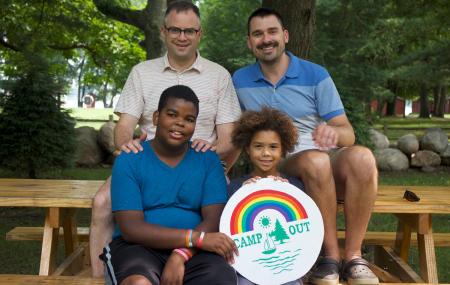
CampOut Family Camp provides a safe space for LGBTQIA+ families to experience the magic of summer camp together.
After previously hosting 20 successful family camps where most attendees were heterosexual couples who identified as cisgender, CampOut recognized their immediate opportunity to serve audiences who had no representation or who may not have been aware of or comfortable at family camp offerings. Understanding that the camaraderie, psychological safety, and fun from camp would have an immediate impact on communities that are typically “othered,” CampOut started reaching out to LGBTQIA+ community organizations across the Midwest to introduce them to the idea. This grassroots marketing effort led to the first 21 families who attended CampOut Family Camp in 2016.
In the seven years since, CampOut Family Camp has grown from hosting 21 families to 65 and now has a lengthy waitlist. The program allows kids to see other families that look just like theirs — sometimes for the first time.
“We’re most proud of the community CampOut has organically created,” Keely Finnegan and Emily Ferdman, co-directors, said. “Camp families who met at camp are now lifelong friends. We get updates of vacations and holidays now spent together, all as a result of their time at CampOut.”
CampOut staff looks forward to providing both a safe and fun space for generations of families to come.
Aspire Adventure Camp
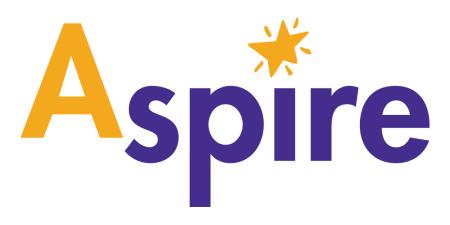
Aspire Adventure Camp is a research and clinically informed therapeutic program run by the Aspire program at Massachusetts General Hospital that teaches skills in a camp setting to campers with autism spectrum disorder. It aims to serve children from diverse backgrounds and offers scholarships to families who need financial assistance in accessing the program.
Aspire Adventure Camp is a six-week program for children ages 5–13. Participants receive direct instruction to support skill-building in the areas of self-awareness, stress management, and social competency in a safe and supportive environment in which campers can learn, grow, make social connections, and have fun. Campers are able to enjoy time outdoors swimming, boating, fishing, and participating in archery, music, and art. Aspire also offers a leadership-in-training program for campers aged 12 and 13 that allows them to hone more advanced executive function, self-awareness, and independent living skills.
“Our teaching methodology incorporates a variety of disciplines, including speech and language pathology, occupational therapy, special education, neuroscience, and psychology,” said Jill Dyment, manager of parent and child services. “A multidisciplinary approach empowers us to see each participant as a ‘whole person’ and provide proactive support within a strengths-based framework. Many of our campers also participate in our academic year social groups to expand and build upon their learning.”
According to Dyment, the Aspire program offers more than 40 hours of precamp training, ongoing professional development, and consistent, structured staff support. They also build parent and caregiver support into their programming through weekly caregiver workshops, pre- and mid-camp phone calls to develop camper goals, and end-of-summer summaries providing progress information related to specific goals. They additionally offer individualized parent coaching, support groups, and facilitated workshops.
In the future, they hope to grow the Aspire program into another location — a site that is more easily accessible through public transportation — so they can serve more individuals from Boston and other urban areas.
Treasure Valley Family YMCA — YMCA Camp at Horsethief Reservoir
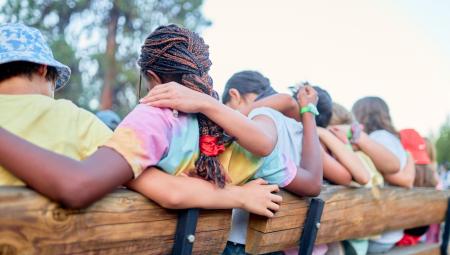
YMCA Camp at Horsethief Reservoir, hosted by Treasure Valley Family YMCA, encompasses nearly 415 acres of forest, wetlands, and waterfront. The camp is dedicated to developing successful youth and responsible members of the community.
“Boise is a ‘welcoming city’ where we have become a sanctuary for refugees and families from all over the world,” said Lincoln McLain, associate executive director. “Our camp is for all, and we’ve taken the challenge to find creative ways to make sure our programs are accessible and inviting to new Treasure Valley residents as well as our faithful longstanding Idahoans.”
The aim is to help campers flourish as responsible citizens of their communities, build relationships with others, develop a sense of self-worth and a strong sense of leadership, and work toward diversity and inclusion.
“We like to say inclusion is not a Kevin Costner baseball movie. To say, ‘If you build it, they will come’ doesn’t work,” McLain said. “We meet our communities where they are. We figure out what will help them be successful in our programs and how we can change and adapt to meet them where they are. We have heavily invested in relationships with partner organizations by listening with empathy to help campers and families who are refugees, first-generation Americans, in foster care, currently experiencing homelessness, low income, or ALICE (asset limited, income constrained, employed).”
In the future, YMCA Camp at Horsethief Reservoir hopes to continue providing inclusive spaces for all campers.
“In our changing world, it is a challenge to create a welcoming space that all campers feel comfortable with,” McLain said. “We feel like we are just scratching the surface of serving all the different communities in our area, and we are excited to continue to develop relationships and evolve as a camp. Ultimately, we will become a different place because we will have incorporated the voices of those currently unrepresented in our program. Welcoming and inclusion are never completed projects.”
Eleanor P. Eells Award for Excellence in Research in Practice
Also given each year since 2015, The Eleanor P. Eells Award for Excellence in Research in Practice honors camp programs that:
- Develop and implement or apply an exemplary research or evaluation project.
- Use research or evaluation findings to improve program practice.
- Develop model research or an evaluation project that can be adapted or replicated.
- Share research or evaluation findings with others.
- We salute this year’s winner.
Camp Twin Lakes
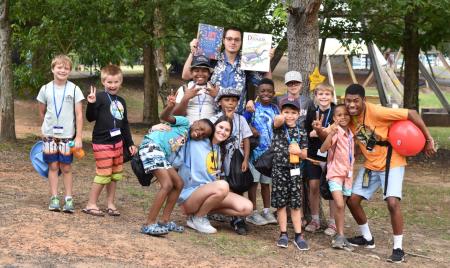
For 30 years, Camp Twin Lakes (CTL) has been working hard to fulfill its mission to provide therapeutic, educational, and recreational programming for children and teens with mental and physical illnesses, disabilities, and life challenges.
Camp Twin Lakes participated in the American Camp Association’s original community of practice to develop a continuous program quality improvement tool and program.
Each year, Camp Twin Lakes takes data from program quality assessments (PQAs) to make tangible operations and programmatic changes to improve staff training, program structure, as well as camper experiences and outcomes. Leadership also analyzes the continuous improvement model to reflect on what worked, what didn’t work, and what they need to change.
“Camp Twin Lakes is a truly exceptional organization that understands the value and power of using data to improve programs, expand fundraising, and make business decisions,” said Anna Hutchins, director of grants and outcomes measurement. “While it’s easy to let those elements and teams become siloed, CTL’s leadership, board, and staff really see how they work together to create impactful programs and a sustainable organization.”
Camp Twin Lakes is also a partner-model organization and works with more than 70 other nonprofits across Georgia and the US.
“Some have their own well-developed data/evaluation programs, and some solely use ours,” Hutchins said. “Together, though, we collect and share thousands of pieces of information that are used to improve the lives of tens of thousands of youths with serious illnesses, disabilities, and significant life challenges — true collective impact.”
For 2024, Camp Twin Lakes is implementing big changes to summer staff training and program structure using data collected over the past three years. The goal is for the changes to lead to improved experiences for all campers and camp stakeholders.
In the future, CTL hopes to expand its camper outcomes framework for older and multiyear campers. Leadership also hopes to learn more about which activities impact camper outcomes and the role that program quality plays in those outcomes.
Kaley Amonett is the American Camp Association's editorial communications manager.


